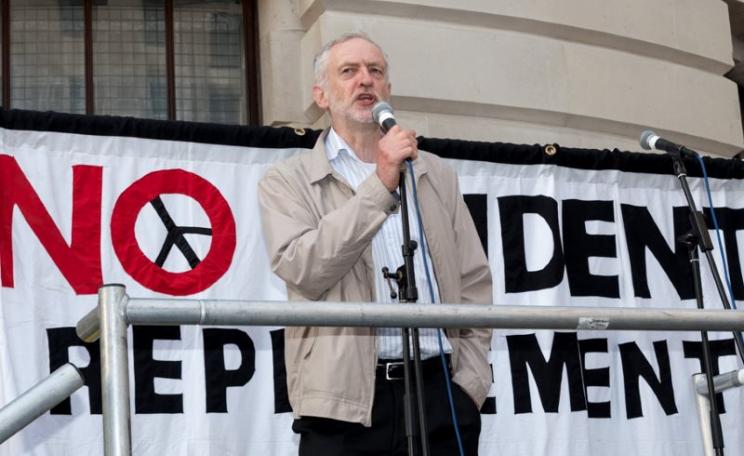Our independent nuclear deterrent is not independent and doesn't constitute a deterrent against anybody that we regard as an enemy. It is a waste of money ... But some people have not caught up with this reality.
For the past three weeks the Nuclear Non Proliferation treaty (NPT) review conference has held at the UN in New York.
It the most important conference of the year so far, but has received minimal media coverage.
With just two days to go, let us hope the British media can at last give attention to this conference - and the political nuclear fallout that will arise from the belligerently bigoted determination of the nuclear weapons powers to retain their self-awarded right to proliferate nuclear weapons.
This is taking place through so-called 'modernization', while they simultaneously berate and bully all other states to refrain from seeking their own nuclear weapons.
South Africa was arguably the most robust in excoriating the self-appointed nuclear weapons bullies - UK, US, Russia, France and China - for their arrogant, insane and multi-myopic determination to retain their vainglorious status as international atomic pariahs.
'Who gives the nuclear weapons States the right to use these weapons to annihilate all of us?'
As South Africa's disarmament Ambassador Abdul Minty, told the NPT meeting on 13th May:
" ... what does this then mean for the commitments made by many leaders to eliminate nuclear weapons? We should instead be saying that despite these calls, we have failed in our supreme responsibility to all of humanity, which all of us hold.
"If we seek to remove ‘under any circumstances', then the question is why do those that have them still want to assert their right to use them under some circumstances.
"We therefore ask, under what circumstances do they still want to use them? What kind of threats do they want to counter? We are all part of the same world and so we have a right to ask these questions.
"The wider question then becomes, who gives the nuclear weapons States (NWS) the right to use these weapons to annihilate all of us - simply because their perceptions may be wrong, or they may be reacting to perceived threats, which do not exist to the magnitude that they assess?"
He later added: "Why is it that only the security of the five requires nuclear weapons, whilst no one else needs nuclear weapons for their security? If the truth is that no one's security needs nuclear weapons, then all of our security is enhanced by getting rid of nuclear weapons."
Kerry: 'This defies all reason'
And here are the words of US Secretary of State John Kerry in his address to the 190-member state NPT Review Conference when it opened at the UN on 27th April.
"For over 45 years, the NPT has embodied our shared vision of a world without nuclear weapons .... it is only by seeking common ground and reinforcing shared interests that we will succeed in realizing a world free of nuclear dangers ...
Our independent nuclear deterrent is not independent and doesn't constitute a deterrent against anybody that we regard as an enemy. It is a waste of money ... But some people have not caught up with this reality.
"When I was a young man, fresh out of college and newly minted in the Navy, I was sent to train at the Nuclear Chemical Biological warfare school. And I learned in graphic detail about what nuclear war would look like, about the damage that weapons of mass destruction can inflict.
"I learned about throw weights and circles of probable damage. And I learned about radiation - not just the immediate harm, but the long-term trauma that it can cause. And when I considered the huge number of nuclear weapons that we were living with back then - late 1960s - I was left with only one conclusion: This defies all reason."
On the next day, the United States Government released new information about the size of the US nuclear weapons stockpile. as Hans M. Kristensen, a senior analyst for the respected Federation of American Scientists, explained in a recent blog posting.
US has dismantled 10,251 warheads over 20 years
Kerry updated the Department of Defense nuclear stockpile history by declaring that the stockpile as of September 2014 included 4,717 nuclear warheads, ie a reduction of 87 warheads since September 2013, when the DOD stockpile had included 4,804 warheads. This reveals a total reduction of about 500 warheads retired since President Obama took office in January 2009.
Kerry also revealed for the first time the official number of retired nuclear warheads in line for dismantlement. As of September 2014, the United States had approximately 2,500 additional warheads that have been retired - but which are still relatively intact and deployable - and awaiting dismantlement.
Moreover, Kerry also unveiled that the Obama administration "will seek to accelerate the dismantlement of retired nuclear warheads by 20%" adding "Over the last 20 years alone, we have dismantled 10,251 warheads."
Big news! But the press are silent
Despite the US's simultaneous nuclear weapons modernization programme, this adds up to an important unilateral diplomatic gesture by Britain's closest political ally - which also provides the UK with its nuclear missiles, warhead designs and calibrations, and nuclear safety R&D support for Trident.
It is a very important piece of international news. But not one word of it has appeared in the British print or broadcast media, as a range of key political issues has been deliberated and debated in the 2015 General Election Campaign. Only Twitter has done this diplomatic development justice.
What does that say about the news values of the British media, which instead has swamped viewers, listeners and readers with hours and pages of political trivia and tittle tattle for weeks?
The issue of Trident has only been discussed in the media as part of the mischief-making over whether the Scottish National Party (SNP), which opposes Trident and wants it dismantled, would cosy-up to Labour in a post-election political pact.
Publicly, the main political (biggest) parties have given the impression they all want to replace Trident with a vastly expensive nuclear weapon of mass destruction: it would cost £100 billion over its operational lifetime.
Labour's departed leader Ed Miliband asserted in the BBC Question Time TV leaders' debate with the audience in Leeds "I'm not going to give in to SNP demands around Trident!"
Despite well-informed dissent, the Trident steamroller rolls on
Later that night, former Conservative Defence Secretary Michael Portillo slammed the notion of Trident replacement, when appearing on BBC's This Week asserting:
"A former defence secretary and some Generals [this week] wrote a letter demanding the renewal of the Trident nuclear weapons programme. You're probably familiar with these men who are worried about their own virility and buy large sports cars, and this I think is a case in point.
"Our independent nuclear deterrent is not independent and doesn't constitute a deterrent against anybody that we regard as an enemy. It is a waste of money and it is a diversion of funds that might otherwise be spent on perfectly useful and usable weapons and troops. But some people have not caught up with this reality."
Moreover, in a Parliamentary debate on 20 January on the Trident WMD programme the current Tory defence secretary Michael Fallon told MPs: "we also share the vision of a world that is without nuclear weapons, achieved through multilateral disarmament."
Now surely if we are remotely serious about nuclear disarmament, multilateral or otherwise, the time to begin the process is now - before we commit countless billions to Trident replacement?
So long as BAE shares are on the up, who cares?
So why have these issues been ignored by the mainstream media? In whose interests is this, beyond a smooth run to making huge profits from the taxpayer by arms sales company BAE Systems, who would build the replacement submarines for Trident?
True to form, the day after the Tory the victory, BAE's share value soared. For the City, immoral nuclear weapons are massive profit makers.
The one story that has played out in the media this week are the revelations by whistle-blowing nuclear submariner William McNeilly that the security of the UK's Trident missiles is non-existent, that the equipment does not work, and that the whole enterprise represents major existential threat to the UK.
Still newspaper are reuctant to draw the obvious conclusion - that the UK's entire nuclear weapons system should be closed down as soon as practically possible. But so long as shareholders are getting rich, why spoil the party?
Dr David Lowry is former director of the European Proliferation Information Centre (EPIC).







